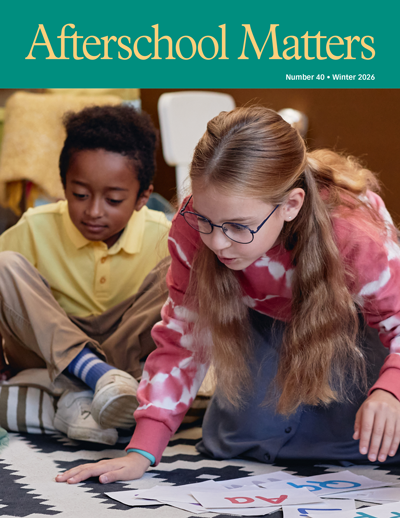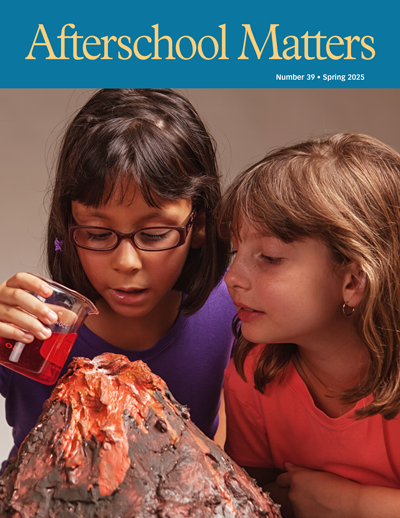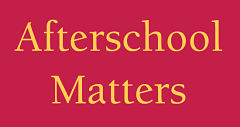Building Civic Skills and Democracy in Out-of-School Time
September 6, 2018
 State primary elections are wrapping up and election season isn't far behind. Regardless of political beliefs, out-of-school-time programs are helping the next generation of voters become informed and engaged citizens, as research from Afterschool Matters has shown.
State primary elections are wrapping up and election season isn't far behind. Regardless of political beliefs, out-of-school-time programs are helping the next generation of voters become informed and engaged citizens, as research from Afterschool Matters has shown.
In "Civic Connections: Urban Debate and Democracy in Action during Out-of-School Time," Georgia Hall looks at how the New York Urban Debate League enables democracy skill building and civic engagement. Such out-of-school-time programs, she writes, "can often reach youth bypassed by traditional sources of civic and democracy development, providing a vision of what 'democracy in action' for underserved youth might look like" and empower youth to become engaged learners and participating citizens. Because these competencies are so important, she says, "we must look to a variety of settings in which youth can experience and build civic skills—not only schools. As is evident in the findings of this research, out-of-school-time programs, such as urban debate leagues, can play an important role in providing opportunities for young people to nurture and practice these skills."
Book clubs may also have a similar impact. In "Creating Engaged Citizens: Using Young Adult Novels and Thematic Units to Encourage Democratic Action," Mary Cipollone writes about her experience with the StreetSquash Book Club of students in Harlem public schools. The students, African American or Hispanic, spent five weeks in the spring of 2004 investigating the civil rights movement, then spent six weeks on the presidential election. Both units used a young adult novel as an entry point to explore a topic "that may otherwise have seemed inaccessible" to the students, Cipollone writes. Through the novels’ young protagonists, students could imagine "their own place in the ongoing struggle for justice" and "their own efficacy in the political arena." Students read and discussed the books--but Cipollone also tried "to make every lesson into a game, incorporate physical activity whenever possible, use video and audio clips to draw the students in, and find ways to relate the topics to their lives." In the end, "the students gained both knowledge and skills necessary for active participation in our democracy."
Students can even make their own books to develop these skills. "The Art of Democracy / Democracy as Art: Creative Learning in Afterschool Comic Book Clubs," by Michael Bitz, looks at community-based afterschool comic book clubs for underserved youth, in which the students sketch, design, produce, and distribute original comic books in their communities. Although the clubs were structured in various ways, they "embodied democracy at its most fundamental level by promoting intellectual freedom in one of the most undemocratic settings in the United States: a public school classroom. As opposed to the sometimes dictatorial relationship between teacher and student often found in school settings, the afterschool comic book clubs subverted that standard by valuing the voice of every individual among the whole," Bitz says. Students in the clubs "are encouraged to express themselves and to take risks in what they say, draw, and write." Not only that, but "The characters take a stand against problems in their community. They rally, they protest, they speak out. In other words, the characters exercise their democratic freedoms.... They are using comic books and other forms of youth media to make their voices heard; their afterschool programs are providing the stage and increasing the volume."
Sometimes, hands-on experience with our democratic processes can make a difference. The annual After-School Advocacy Day in Albany, New York, includes over 100 scheduled meetings with legislators and aides to help young people convince them to continue and expand afterschool programming. In "Democracy in Actıon: Experiential Civics Learning in Afterschool Advocacy Days," Susan Blank with Lucy N. Friedman and Kathleen Carlson look not only at the day's legislative achievements, but also at its educational and youth development impact. "Advocacy Day exposes young people to an experiential civics lesson that gives them a feel for participating in democratic processes. The event’s active and participatory nature also offers youth opportunities to exercise leadership and speaking skills that contribute to social and emotional growth," they write. They also highlight ways that organizers can "provide youth with enough guidance and information to help them make sense of the political process, while at the same time offering them the opportunity to claim the experience as their own."
Looking for activities to foster collaboration and respect in your community? Check out these activities designed to foster positive attitudes and stronger affiliations among students, teachers, and the surrounding community of the school. The project activities highlighted in this publication were conducted within school-based afterschool programs run by community-based organizations, and were part of Discovering Community, a national initiative created by The After-School Corporation (now ExpandED Schools) and MetLife Foundation.



